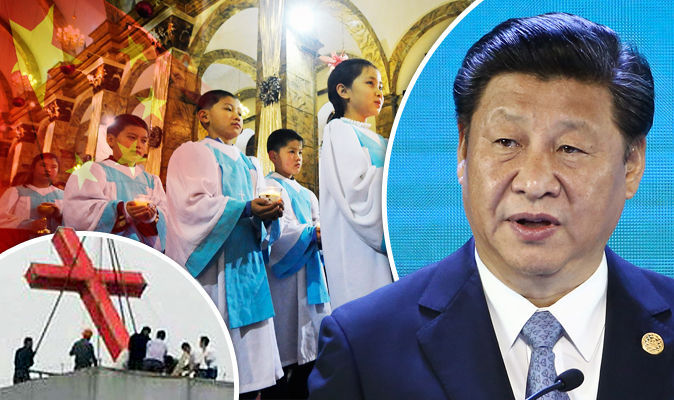Beijing: As the Chinese Communist Party (CCP) intensifies its campaign against religious freedoms, alarming reports have emerged regarding the systematic removal of Christian symbols and the replacement of sacred imagery with portraits of President Xi Jinping. This troubling development highlights the precarious situation of Christianity in one of the world’s most populous countries, where millions of believers face increasing repression as reported by Angelus News. Photo courtesy: CNA
A recent analysis by the United States Commission on International Religious Freedom (USCIRF) reveals a disturbing trend: the CCP is enforcing a policy of "sinicization of religion," which prioritizes the party's political agenda over the fundamental rights of religious practitioners. This strategy effectively subjugates faith to a Marxist vision, placing the party's ideology at the forefront of religious expression.
The report details how government officials are not only ordering the removal of crosses from churches but also censoring religious texts and coercing clergy to preach CCP ideology. Additionally, churches are now mandated to display party slogans, marking a significant shift towards the politicization of faith.
To further consolidate control, religious groups must register with government-sanctioned "patriotic religious associations." For Catholics, this means compliance with the Bishops’ Conference of the Catholic Church in China, a body directly overseen by the State Administration for Religious Affairs. Those who refuse to conform face severe repercussions, including arrest and classification as "cult" members, a designation that has been used to justify crackdowns on underground congregations.
USCIRF Commissioner Asif Mahmood underscores the threats faced by underground Catholics, who are viewed as a danger due to their refusal to accept the government’s authority over religious doctrine. This ongoing persecution raises significant concerns about the viability of Christianity in a country where the population exceeds 1.4 billion.
Despite a 2018 agreement between the Vatican and the CCP to cooperate in the appointment of bishops, the Chinese government has continued to unilaterally install leaders aligned with its interests, often disregarding Vatican authority. The disappearances of numerous underground Catholic leaders who resist state control signal a deepening crisis for religious communities.
The government's actions extend beyond Christianity; they encompass a broader crackdown on all religious practices, including the persecution of Muslims, Buddhists, and practitioners of indigenous faiths. Particularly alarming is the situation of Uyghur Muslims, who are reportedly subjected to forced internment and coerced assimilation in re-education camps. Such actions have drawn international condemnation as potential genocide and crimes against humanity.

Historically, the CCP has viewed Christianity as a foreign threat to its governance, with party officials declaring that socialism would eventually replace religious beliefs. This vision has translated into strict monitoring of religious activities, with many Christians facing imprisonment for openly expressing their faith. Reports of church closures and the dismantling of crosses reflect a calculated effort to diminish Christian influence in Chinese society.
In the light of these developments, the future of Christianity in China appears increasingly precarious. With estimates ranging from 20 to 81 million Christians practicing their faith, the repression of religious freedoms raises profound concerns not only for believers within China but also for the global Christian community. As the CCP tightens its grip on religion, the resilience of Chinese Christians is being put to the test, leaving many to wonder what lies ahead for this vital aspect of human expression in the world’s most populous nation.